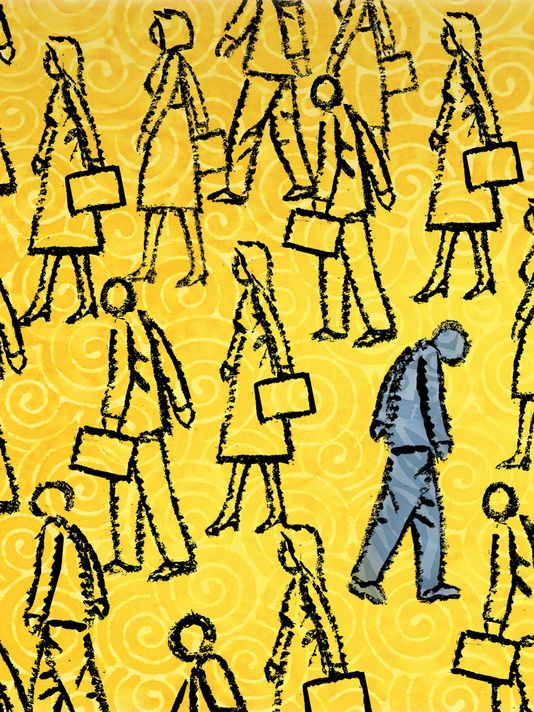At Work: Job, self-esteem tied tightly together
Work means so much to us Americans that without it some people don't want to get out of bed in the morning.
That is likely one reason unemployed adults and those not working as much as they would like are twice as likely to be depressed as Americans employed full time.
STORY: Who's feeling stressed? Young adults
COLUMN: Workers' happiness rubs off on profits[1][2]
That's the conclusion of a Jan. 1-July 25 survey of more than 100,000 Americans conducted by the Gallup-Healthways Well-Being Index[3]. It says 16.6% of unemployed Americans are depressed compared to 5.6% of those who work full time.
"Self-esteem and self-worth are closely aligned with working," says psychotherapist Charles Allen, who estimates about 10% of his clients are out of work or worried about losing their job.
When you have a job, you have a continuous source of feedback that you are a contributing member of society, he says. That's not to say you go to work thinking, "Hey, I'm a valued member of society." The idea is largely subconscious.
"You feel it in the depths of your brain," he says.
Being employed helps you feel wanted and that you're contributing to your finances, says psychotherapist Elizabeth Lombardo. It also gives you social support — "a buffer against depression."
In his practice, psychotherapist Jonathan Alpert sees a lot of unemployed people who are depressed.
He describes them as usually feeling hopeless and helpless, their sense of identity greatly diminished.
“Employment provides a sense of purpose, … of belongingness. Those who are unemployed lack that purpose.”
— Jonathan Alpert, psychotherapist"Employment provides a sense of purpose, … of belongingness," he says. "Those who are unemployed lack that purpose."
Some unemployed workers also lack structure, which leads to unhealthy habits like staying up until 3 a.m. then getting up late the next day. That "makes them feel even more different than the employed," Alpert says.
Being depressed also can affect your ability to seek and keep a job.
Allen's depressed clients who are unemployed "typically have tremendous difficulty in finding work because they lack energy and drive to engage in a job hunt," he says. Their pessimism and feelings of worthlessness also contribute to the idea that they won't find work.
When motivation plummets, you withdraw and "why bother?" prevails, Lombardo says. A depressed person may not do well in interviews.
"Who wants to hire 'Debbie Downer?' " she asks.
Some people who are depressed can have a tough time keeping a job: They take too much time off, have a lack of drive, don't concentrate well and sometimes simply don't care, Alpert says.
They also "often have a poor self-image and lack confidence, two factors that strongly impact job retention and performance," he says.

If she were having that cup of tea in a break room at work, she would be less likely to be depressed, a Gallup survey says.(Photo: Jupiterimages, Getty Images)
Alpert says he also sees a lot of another type of depression — in people who are employed.
It "usually stems from high stress and feeling disenchanted with their job or simply unhappy with the direction their career has taken them," he says.
Feeling stuck in a position "can bring about a sense you have no control over your situation," Lombardo says. "Feeling powerless can cause depression. And depression can lead to getting demoted."
Depression among those with jobs costs U.S. employers $23 billion annually in lost productivity, according to Gallup.
The survey found that depression decreases as income rises. It showed that Americans who earn less than $36,000 annually are nearly three times more likely to be depressed than those who earn more than $90,000 annually.
Depression takes a toll on a person — employed or jobless — as well as the economy.
It may be depressing to talk about depression. But the more we know about it and discuss it, the more likely the stigma associated with it will be reduced.
And perhaps the people who need help the most will get it.
Career consultant Andrea Kay[4] is the author of This Is How To Get Your Next Job: An Inside Look at What Employers Really Want. Reach her at This email address is being protected from spambots. You need JavaScript enabled to view it.[5]. Twitter: @AndreaKayCareer[6].
References
- ^ http://www.usatoday.com/story/news/nation/2013/02/06/stress-psychology-millennials-depression/1878295/ (www.usatoday.com)
- ^ http://www.usatoday.com/story/money/columnist/bruzzese/2013/02/09/on-the-job-employee-happiness/1898083/ (www.usatoday.com)
- ^ Gallup-Healthways Well-Being Index (www.gallup.com)
- ^ http://andreakay.com/ (andreakay.com)
- ^ This email address is being protected from spambots. You need JavaScript enabled to view it. (rssfeeds.usatoday.com)
- ^ http://twitter.com/AndreaKayCareer (twitter.com)










